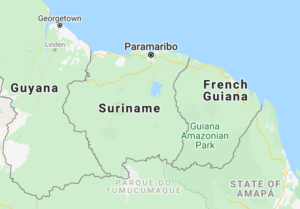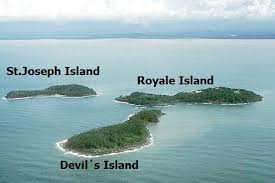 First settled by the French in 1604, French Guiana was captured several years later by Dutch authorities. Jews arrived in French Guiana by way of the Dutch West India Company. The Dutch relied on the Jewish settlers to carry out their plans and settle the newly claimed colony. Their objective was to attract Jewish farmers and merchants experienced in managing tropical products. On September 12, 1659, a group of Portuguese Jews first arrived in French Guiana from Brazil.
First settled by the French in 1604, French Guiana was captured several years later by Dutch authorities. Jews arrived in French Guiana by way of the Dutch West India Company. The Dutch relied on the Jewish settlers to carry out their plans and settle the newly claimed colony. Their objective was to attract Jewish farmers and merchants experienced in managing tropical products. On September 12, 1659, a group of Portuguese Jews first arrived in French Guiana from Brazil.
From 1658 to 1659, Paulo Jacomo Pinto began negotiating with the Dutch authorities in Amsterdam to allow a group of Jews from Leghorn, Italy to settle in the Americas. On July 20, 1600, more than 150 Sephardic Jews left Leghorn and settled in Cayenne.
The Jewish settlers negotiated with the Dutch authorities a grant of liberties and exemptions from laws placed on other colonisers. The Jews established sugarcane plantations, a sugarcane mill, and indigo dye workshops. The Jews also improved relations with the local natives and utilized their knowledge of the country. The Jewish community isolated itself from other inhabitants of the island by constructing a protective fort. The community developed an organized Jewish communal life. By the early 1600s, the Jewish population in Cayenne had grown to approximately 450 people.
On February 26, 1664, a French fleet of five vessels and 1,200 settlers arrived in Cayenne. The Dutch Jews surrendered without a fight, so long as they could continue to freely practice Judaism. The French agreed to those terms. Nevertheless, nearly two-thirds of the population left for the English colony of Suriname. In 1667, the remaining Jewish community was captured by the occupying British forces and, moved the population to either Suriname or Barbados to work in sugar cane production.
 Since the late 1600s, few Jews have lived in French Guiana. In 1992, 20 Jewish families from Suriname and North Africa attempted to re-establish the community in Cayenne.
Since the late 1600s, few Jews have lived in French Guiana. In 1992, 20 Jewish families from Suriname and North Africa attempted to re-establish the community in Cayenne.
Today, 80 Jews live in French Guiana, predominately in Cayenne. Cayenne, the capital, has played a pivotal role in Jewish history because it is there, on Devil’s Island, where Captain Alfred Dreyfus was imprisoned after being falsely convicted of being a German spy. Devil’s Island is actually one of a group of three small islands off the coast of Cayenne and can be clearly seen across a narrow, shark-infested channel from Royale Island.